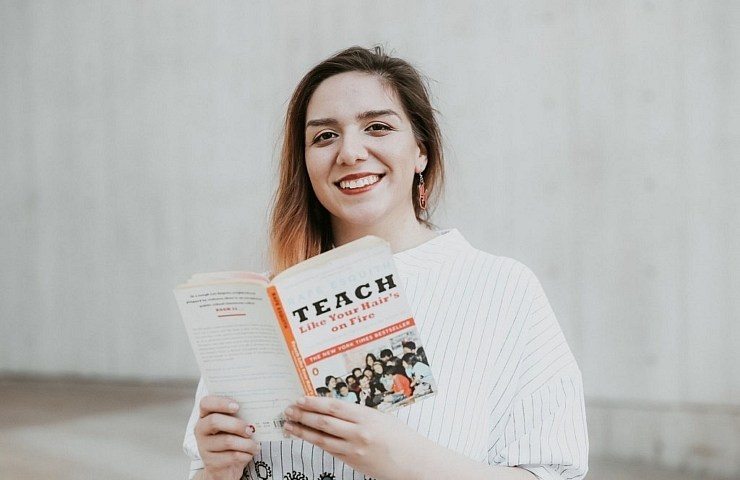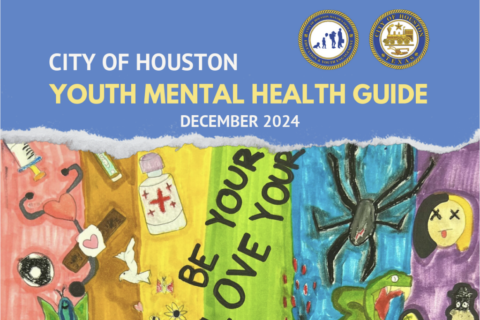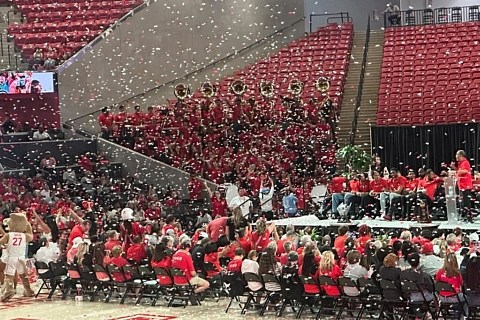As a child, Salma Yousef’s least favorite subject was social studies. The self-described bossy, determined little bookworm sought something more stimulating. Growing up, she hardly ever received social education. When she did, it consisted of a dull page out of a textbook followed by a quiz. It was unengaging, irrelevant and quickly forgotten.
Today, Yousef is a fourth-grade teacher in Fort Bend country, pursuing a master’s of education in curriculum instruction and social education. Her intention with the degree? To become a curriculum writer in social education. What are the odds?
Her passions in high school centered around writing and music, so she assumed her college major would involve those interests in one way or another. However, her trajectory would be forever changed by a key educator during her junior year.
Finding her calling
“I was accidentally put in a journalism class with a man named Mr. Rideout, who absolutely changed my life,” Yousef said. “I would observe him interact with his students and myself. It was a random class. I didn’t sign up for it, I was just there. But it turned out to be one of the most powerful classes in high school. My biggest takeaway was he was doing important work. He was going in there and he was teaching ethics and life lessons. And all these random students who had nothing in common would go in there, and we would listen to him, learn from him and we would love him and love this class. I just felt like he was doing important, powerful work. I kind of just threw my own personal interests out the window and I was like ‘I need to do that.’ They felt important, and I wanted to do something that was important. So I decided I was gonna major in education.”
Yousef went on to graduate from the University of Houston in 2020, snagging a job as a teacher soon after. She graduated and started her first job during the pandemic. It coincided with one of the greatest movements of civil unrest of her time. Children began coming to her with difficult questions, and she did her best to answer honestly in a kid-friendly way. She was quick to notice where the social education system fell short, doing her best to fill in the gaps.
Although she was confident that she was doing right by her kids, she knew they may not receive the same quality of information from other teachers who were going purely by the written curriculum they were given. She thought back to the social education classes she’d taken at UH during her undergrad, of how unnecessary she’d thought they were. Diversity, inclusion, all things she thought were obvious. But as a young teacher, she realized that was not always the case.
“I have now realized it’s not obvious and common sense to every educator,” Yousef said. “There are a lot of educators who negatively stereotype students based on their skin color, who genuinely don’t understand how to deliver high-quality education to lower economic populations of students.”
Deciding to go back
Despite the hard work and long hours, she loved her students, putting even more time into creating the best lessons and learning environment she could. Soon, she realized that her current salary was not satisfactory, not in terms of her needs, nor in compensation for her work. Her contract hours are from 7:50 a.m. to 3:50 p.m., but she works a lot more than that. Meetings, paperwork, lesson planning, logistics and communications outside of work hours don’t even begin to cover half of it.
“I have never been one of those people that thought I would enter education and retire into it,” Yousef said. “I knew that I would eventually want to move out of it. This degree… My resume is all child care. There’s not a lot of things I can do with my undergrad degree that are outside of the education field. So thinking about that, and knowing that I didn’t want to be in the classroom forever, I needed to pursue something that would be interesting, something that I can continue to grow in.
When an educator decides to pursue a master’s degree, there are a few different paths they can take. ELA specialists will go back to become English specialists, math teachers will go back to become math specialists, and so forth. Instead of becoming a reading specialist, she realized she could make a bigger impact on more people by changing the curriculum from the top.
Fueled by the desire to grow her career and now armed with a need to improve social education, she decided to go back to school and get a master’s degree.
Getting in
Applying was easy. The college of education is very straightforward. Yourself was able to follow the application process, step by step, on the UH masters of education page. The difficult part was financing her degree.
“I went through undergrad completely on grants,” Yousef said. “Pell grants and Texas grant and all of that. I didn’t have to pay anything out of pocket. Grad school is a different story. Because I have a salary now (which we know it’s not a big salary) FAFSA said ‘well you’re making money so you’re alright.’ So I was not offered a lot by FAFSA, which meant my options were to take out a loan or pay out of pocket. So… I took out a loan.”
Her master’s program is completely online, something she is very grateful for. Those at the college of education understand most of their students are full-time teachers that work long hours. Making it to campus after school through Houston traffic would have been less than ideal. Although she hasn’t made as many friends as she did during her undergrad, she has found maintaining a work-life balance to be easier.
Yousef has chosen a capstone seminar as her final project, which is best described as a hybrid between a thesis and a project, all relating to social education.
“I was advised to go this route due to being a full-time teacher,” Yousef said. “They said this is probably the best route. Thinking about what I wanted to do with my degree afterward, the capstone, because of that thesis portion and the fieldwork, serves as really strong evidence that I know what I’m talking about.”
The best thing about graduate school was all the things she learned about that she didn’t even know she didn’t know. She was in awe at the talent and knowledge her professors hold, even going as far as to cite one of her professors in her thesis. The worst thing? The three mandatory electives. She found uncovering which electives were available to her difficult. Many of the ones that would be of interest had prerequisites she didn’t meet.
“UH advisors, it would be so helpful if you could make a list of electives that closely align with the major that that student is in,” Yousef said. “That would be more helpful instead of telling your students ‘search for your own electives.’ We don’t know where to start with that. You are so much more knowledgeable.”
Looking forward
Yousef’s long-term goals include becoming a curriculum writer, creating new content for TEKS, and revising preexisting content to better serve students and educate teachers. In the short term, however, her degree will serve as an advocate to her own knowledge. As a younger teacher who is more in tune with the attitudes and needs of the youth, it can sometimes be difficult to be taken seriously by one’s peers.
“It (the degree) would empower me to speak up for myself as a teacher,” Yousef said. “Knowing your rights, knowing what I can and can’t teach and the limits of that, especially in Texas, where they are, opposing limits that are sometimes illegal and have nothing to do with what we’re really allowed to do. And then also just learning how to best deliver sometimes highly sensitive lessons to students who are interested in their history and the current events.”
Early education is the foundation of the people who will shape the future of our nation. As important as the core curriculum is, it’s social skills that will shape the future. Understanding history in a nuanced fashion and how to treat people fairly in an increasingly diverse country are crucial skills to ensuring a thriving economy, culture and democracy in years to come. Salma Yousef went back to school to work towards providing a better future both for herself and for her country’s youth. Although her goals and path aren’t the same as yours, her end goal is.





Recent Comments